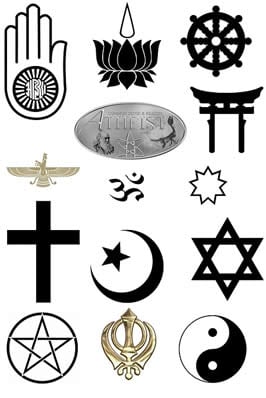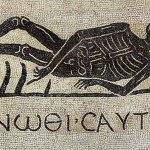Religions are often associated with moral values, so much so that in the modern day it seems that most people assume that morality is the entire purpose of religion. Others may disagree, but personally I find more value in religion as a codified method of interacting with and understanding spiritual experiences, one that a social network tends to form around as people who use similar spiritual technology tend to want to communicate with one another regarding it.

Nevertheless, the big monotheistic faiths of the last couple of millennia and their many, many offshoots seem very concerned with how individuals behave. People coming to a modern Pagan practice from those religions seem to have a desperate need to codify rules of proper behavior for themselves and others. While examination of the texts that we use to guide our spiritual lives and the conclusions that we draw from our experiences may engender values in us, that is a far cry from creating rules of conduct that we and others who follow our paths must follow.
Constructs like the Asatru Nine Noble Virtues and ADF’s Nine Virtues have always seemed rather arbitrary to me. There’s a quality to them that makes me wonder if those that created them wanted to say, “See, we’re a real religion too! We have morals (™)!” There have been a lot of actions and trends in modern Pagan movements (and for the sake of this discussion I’m including Heathenry and other Recon paths) that seemed to have occurred in a struggle for religious legitimacy as we try to squeeze our paths into molds that fit commonly-accepted concepts of what a religion is. For some reason the artificial codification of morality is one of those trends that bothers me deeply.
I will admit, one of the things that bothers me about it is that the Gods themselves don’t hew perfectly to the moral codes supposedly inspired by their tales. In Norse mythology, the Gods break hospitality, deceive one another and humans, shatter one another’s trust, trick others into doing work for them – the list goes on, and for every example I can find that fits one of the NNV I can find another couple where one of the Gods (and no, not always or even mostly Loki) does something that flies in the face of them. Including Odin Allfather, whose words are recorded in Havamal, one of the major inspirations for them. I don’t expect our Gods to be perfect by our standards, or even have comprehensible motives, but I am surprised at using their words to derive codes of morality that they themselves do not seem to adhere to.
My morality is personal; I don’t expect other people to follow it. I might not want to associate with someone with significantly different values than I have, and I might stand up to try and prevent them from doing something that I consider harmful, but by and large I’m not going to try and tell them how to live. My values are generally inspired by people (and, given that I’m an animist and polytheist, I’m going to include non-corporeal beings under that heading) who I admire. When someone’s behavior strikes a chord in me I try to take note and compare it against my own life and how I feel about it, and if it’s an example that I consider worthy I’ll attempt to follow it.

This does tie into my religion, however, from the long way around. The Gods that I honor most are the ones whose actions I most admire. So while I don’t believe in codifying them for other people, as my Pagan practice has evolved and changed over time, I’ve learned to look to my Gods for inspiration in ways to behave.
Many polytheist-type people will remind each other that our Gods aren’t (by and large, depending on the tradition) considered perfect. In my own Heathen tradition there are no Gods who I view as absolute moral guides; nearly all of them that are portrayed with any complexity are portrayed with weaknesses or behavior that not everyone will agree with. That does not mean that their examples cannot be learned from. In my case, and in the case of others who feel the draw to a particular deity or group of deities, it is possible to construct examine their behavior and find qualities that you may consider worthy of emulation.
I’m a Freyjaswoman. I have a personal oath of devotion to Her. There is no Power out there who I admire as much as I do Her. Being devoted to Her, I find the values in Her that I consider worthy and seek to emulate them; I would not honor Her with such singular devotion if I did not think that She was worthy of respect, and many of the reasons that I respect Her revolve around Her deeds.

So, in meditating on Freyja I’ve come to personally codify the Virtues that I see in the Lore about Her and Her actions:
Integrity: Freyja is honest and keeps Her word. In the Lay of Hyndla, She goes out of Her way to help a follower of Hers because he has given Her much and served Her well. She does not shrink from Loki’s accusations of having slept with all the Gods in the hall. In modern times, She is well-known for challenging devotees of Hers who are lying to themselves or hiding from themselves.
Self-Determination, Personal Sovereignty: While Her brother and father were taken as part of the hostage exchange in the Aesir/Vanir war, I have yet to find a reference to the same happening to Her. It seems that She comes to Asgard of Her own accord and will. When the Gods promise Her hand in marriage to a giant (this happens twice, you’d think that they’d have learned the first time) She refuses with such vehemence that in both cases they decide to trick the giants rather than risk Her wrath. Modern gnosis is full of tales of Her encouraging people to own their decisions and take responsability for their own lives.
Passion: Freyja saw Brisingamen, and She wanted it. The dwarves who crafted it wanted to be intimate with Her, and She paid their price for what She wanted. As mentioned above, She had slept with every God at the feast in Aegir’s hall and likely others aside. When the Lady truly wants to do or have something She will find a way and none can gainsay Her in the end. Her passion fuels Her will and drive. Those who feel close to Her often experience hidden desires becoming manifest, and as a result find new fuel for the fires of their own wills to achieve what they truly want.
Love and Devotion: Freyja’s devotion to Her lost husband Odr has Her flying from one end of the worlds to the other searching for him, weeping tears of amber and gold. The Lady knows love, knows how to love truly and deeply, as an action as well as a devotion. Many pray to Her in matters of love, and She is well known for her spectacular responses to these entreaties.
Beauty: Many epithets and tales about Her speak of Her beauty. Beauty is a thing that can be cultivated, and is not limited to physical beauty (although that is a component about it). Beauty as a virtue includes finding value in things and bringing that value to light and empowering it. It can also refer to living in such a way that your life is a thing of beauty, creating a divine aesthetic through your deeds that any who look at the tapestry of your experiences will be in awe of their richness, symmetry, consistency and experience admiration for them.
Because I love, respect, and admire Her, these are qualities that I try to emulate in my own life. I think that meditation on the actions of the deities that we are most drawn to can help us to understand not only the Gods better but why we are drawn to them and what sort of moral qualities we admire and value. I know that I’m not the only polytheist or Pagan type person to feel uncomfortable with the sets of rules laid down by others based on their own interpretations of our lore. I encourage everyone to find examples among the Gods, Ancestors, spirits, animals, manifest nature, and other living human beings to inspire their behavior and morality.

Patheos Pagan on Facebook.

the Agora on Facebook
The Lady’s Quill is published on the second and fourth Thursday of every month. You can subscribe by RSS and e-mail.
Please use the links to the right to keep on top of activities here on the Agora as well as across the entire Patheos Pagan channel.

















